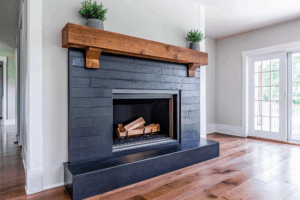
For years, the two interior design and construction giants have battled for the spotlight: granite vs quartz countertops. But which one truly reigns?
The truth is, it depends on what you need. Are you creating a sleek, modern kitchen or a classic bathroom? Your choice comes down to your style, how you’ll use the space, and the look you’re going for.
Granite vs quartz countertops is a dispute of popular materials known for their durability, versatility, and beautiful designs. But they’re different in ways that only one can become a better fit for your home.
Want to find out which material suits your space? Keep reading to get expert tips and make the right choice!
What is quartz?

Quick disclaimer: This article will focus on quartz used in countertops (not the pure mineral quartz).
Quartz countertops are engineered stone surfaces with 90-97% crushed quartz crystals, bonded with polymer resin. The remaining material mix might include metal flecks, mirrors, shells, or colored glass. These additions give quartz its modern, eye-catching look.
Lately, in the debate of granite vs quartz countertops, quartz has skyrocketed in popularity. According to Kitchen & Bath Design, it’s now the top choice for countertops, beating even long-time favorites.

The quartz’s growing popularity is no surprise. It’s a versatile material, low-maintenance, and perfect for homeowners who want a contemporary style. As a result, quartz has earned its place alongside timeless materials like granite and marble.
TIP: Quartz and quartzite might sound similar, but they’re different. Quartzite is a natural stone, while quartz countertops are man-made.
Now that you know what quartz is, let’s dive into granite and see how it compares!
What is granite?

One of the biggest differences between granite and quartz countertops is their origin: granite is all-natural, while quartz is engineered.
This natural quality makes every granite piece unique. No two slabs have the same patterns, colors, or textures, creating a one-of-a-kind look that showcases the beauty of nature (we’ll dive deeper into this in the sections ahead).
Granite’s distinct granular structure and various colors and finishes make it a standout option for style and durability. Its natural toughness and appeal have kept it at the forefront of home design.
Now that you’re familiar with the fundamental differences in the granite vs quartz countertops debate let’s explore the pros and cons of each material to help you decide which material fits your style, needs, and budget!
Pros and cons: Granite vs quartz countertops
The heated debate over granite vs quartz countertops often comes down to comparing their strengths and weaknesses. Both materials offer standout qualities, but as we’ve mentioned, the right choice depends on what you require for your home.
To make things easier, here’s a closer look at the pros and cons of granite vs quartz countertops:
Pros of granite countertops
Natural beauty
Granite’s appeal lies in its natural formation. Each slab tells a story, with distinct veining, color variations, and textures shaped over millions of years. This adds authenticity and elegance, transforming any countertop into a conversation piece.
Heat resistance
Granite can handle high temperatures without getting damaged. Whether you’re cooking with a hot pan or pulling out a pot straight from the oven, you don’t need to worry about burning or harming the surface.
This makes granite ideal for kitchens where cooking heat is a regular factor. Unlike quartz countertops, granite won’t warp or stain from direct contact with heat. Just make sure to use trivets for pots or heavy pans to keep your counters in top shape.
So, this durability and strength are perfect if you’re looking for a countertop that can handle all your kitchen heat when comparing granite vs quartz countertops.
Durability
Granite is one of the hardest natural stones available, resistant to scratches and chips. With proper care, granite countertops will remain in excellent condition for decades, making them a reliable long-term investment.
Cons of granite countertops
Maintenance and sealing requirements
Because granite is porous, regular sealing is required to maintain its protective layer. Skipping this step can lead to moisture absorption and make it more challenging to clean stains .
Susceptibility to staining
Even when sealed, granite isn’t entirely stain-proof. Spills, especially from wine, oils, or acidic liquids, should be cleaned quickly to avoid permanent marks.
Style limitations for future updates
Kylie Mawdsley recently pointed out something important: Granite countertops installed in the 1990s and 2000s can feel outdated. Their bold patterns and specific colors can lock kitchens or bathrooms into one style. If the person with these slabs at home wants to update things like cabinets, wall colors, or decor, their granite choice could limit the options.
So, when choosing granite vs quartz countertops, think about how its color and pattern will work with future updates. Picking the wrong one could tie your space to a certain style, making changes harder. Consider how versatile the stone will be for your future design plans.
Pros of quartz countertops
Endless design options
Quartz is incredibly versatile. Thanks to its engineered nature, it’s available in various colors, patterns, and finishes. Want the elegance of marble or the natural vibe of granite? Quartz can mimic those looks while offering modern alternatives to match any home.
Low-maintenance convenience
Quartz’s non-porous surface is a game-changer. Unlike granite, it doesn’t need sealing. It resists stains, moisture, and bacteria, making it perfect for kitchens or bathrooms. Cleaning is effortless; just a simple wipe with mild soap and water.
Consistent appearance
If you’re looking for consistency when comparing granite vs quartz countertops, quartz is a great choice. Its engineered design ensures an even color and pattern throughout the slab. This can be a major advantage if you want to avoid the natural variations of granite.
Cons of quartz countertops
Less natural appeal
While quartz has a natural base, its engineered aspect can be seen as a downside if you’re drawn to the raw beauty of entirely natural materials like granite.
Vulnerability to heat
Quartz isn’t as heat-resistant as granite. Directly placing hot pots or pans on the surface can lead to discoloration or cracks. For avid cooks, it’s essential to use trivets or heat pads to protect your countertop.
Higher cost
Although quartz has become increasingly popular, its engineering process and modern look come at a cost. Quartz countertops are pricier than granite, which can make them less accessible for homeowners on a tight budget.
The decision between granite vs quartz countertops comes down to your needs and priorities. To help you make the right choice, here’s a comparative table.
Comparing granite vs quartz countertops
| Feature | Granite | Quartz |
| Timeless natural beauty | Granite’s unique veining and color variations add natural elegance, making each countertop one-of-a-kind. | Quartz offers consistent patterns and colors, ideal if you want uniformity across the surface. |
| Heat resistance | Granite can withstand high temperatures without damage, perfect for cooking-heavy kitchens. | Quartz is less heat-resistant; direct exposure to hot pots can cause discoloration or cracks. |
| Durability | Granite is tough, resisting scratches and chips with proper care. It’s a long-term, reliable investment. | Quartz is durable, but may show wear over time. |
| Maintenance & sealing | Granite is porous and requires regular sealing to protect from moisture and stains. | Quartz is non-porous and doesn’t require sealing, offering low maintenance. |
| Staining & cleaning | Granite is stain-resistant but still needs prompt cleaning for spills, especially from oils and acidic liquids. | Quartz resists stains and is easier to clean, as it doesn’t absorb liquids. |
| Style flexibility | Granite’s colors and patterns may limit future updates. | Quartz’s colors allow you to match different design styles easily. |
When to choose granite vs quartz countertops: Practical examples
When deciding between granite and quartz countertops, your choice will depend on your lifestyle, aesthetic preferences, and needs.
Here’s how to decide which one fits your home:
When to choose granite
For bold visual impact
Granite makes a strong statement with its natural patterns and striking colors. If you’re designing a space where the countertop will be the centerpiece, like a bold kitchen island or a unique bathroom vanity, granite’s distinctive look can add character and depth to your space.
For high-traffic areas
Granite is highly durable, making it ideal for busy kitchens or outdoor spaces with a lot of activity. It resists scratches, holds up to everyday use, and stays looking great even with frequent wear.
For natural connection
Granite’s organic origin and earthy textures bring a sense of calm and harmony, making it perfect if you love integrating natural elements into your spaces.
When to choose quartz
For a clean and hygienic countertop
If keeping your home clean is a priority, quartz is a wise choice. Its non-porous surface resists bacteria and moisture, making it cleaner with less effort. Whether in your kitchen or bathroom, a simple wipe helps create a healthier space.
For spaces with limited natural light
Quartz can brighten darker areas of your home. Many options have a subtle shine that reflects light, making small or dark rooms feel brighter and more open. It’s great for basements, compact kitchens, or bathrooms without windows.
For endless design options
Quartz lets you create a space that’s truly yours. It comes in various colors and patterns, from bold looks to soft neutrals. Unlike natural materials, quartz gives you more control to match your vision.
Why choose Classic Stoneworks?

When it comes to transforming your home with beautiful countertops and vanities, or getting help to decide between granite vs quartz countertops, Classic Stoneworks is the perfect choice.
Here’s why homeowners and businesses across New England trust us:
Premium materials
In the battle between granite vs quartz countertops, we stock colors and patterns for both materials. Check out our products to find your perfect match.
Exceptional craftsmanship
Our team specializes in fabricating and installing high-quality kitchen countertops, vanities, fireplace surrounds, and more. Every project reflects our commitment to detail and durability. View our portfolio for inspiration.
Personalized customer service
Your wish is our priority. We work closely with you from start to finish, ensuring your project meets your needs.
Professional installation
Trust our experienced team for seamless and hassle-free installation. Whether it’s a kitchen countertop or a custom shower wall, we’ll handle every detail with care and precision.
Making the final choice: Granite vs quartz countertops
Choosing the right material in the battle of granite vs quartz countertops comes down to what works best for you.
Your choice depends on your lifestyle, design preferences, and how much maintenance you’re willing to take on.
This article covered the pros and cons of granite vs quartz countertops, highlighting durability, maintenance, and style. Here’s a quick recap:
- Granite: Great for durability and a natural look but needs sealing.
- Quartz: Low-maintenance and versatile, but it’s not heat-resistant.
Now, are you ready to transform your space? Don’t wait to make your dream come true!
Book a free consultation today. Call us at (603) 696-2573 or schedule an appointment online.
We’re here to help you find a countertop you’ll love for years.











